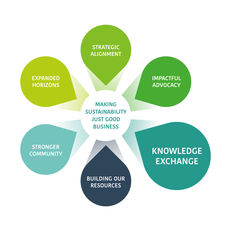EAUC commissioned the research paper ‘Next Generation Sustainability Strategy and Structure’ to help members understand the current sustainability landscape in tertiary education.
This case study is from University of Edinburgh
Structure: Dedicated Department
Highest level of authority: Executive Level
Web: http://www.ed.ac.uk/about/sustainability
Created in 2014, the Department for Social Responsibility and Sustainability (SRS) at the University of Edinburgh sits within the Corporate Services Group, alongside others including Procurement, Health and Safety, Estates and Finance. The department has a staff of 16, and focuses on two broad themes. The first of these is strategy, defining SRS issues in relation to the university and how it should respond to them and including a responsibility to shape a coherent narrative on how the university is responding. The second theme is concerned with delivery, including practical programs of training, awards and events which are aimed at raising awareness around issues. Additionally there is a social responsibility and sustainability committee, chaired by a Senior Vice Principal who also acts as an academic lead. Other senior academics are also heavily involved; this gives the committee authority and influence across academic areas.
The department has a stand-alone budget, but their work is also to a certain extent embedded in budgets elsewhere such as Estates, by influencing their spend towards sustainability and social responsibility issues. SRS is incorporated into the university’s overarching strategic plan, currently including one KPI in relation to climate emissions. There is also a standalone SRS strategy, which gives scope for a wider range of indicators.
The approach is transferable in that it is about change management, with a strategy of identifying the issues faced by the university and what can be done about them; the caveat to transferability is that the most appropriate set up would depend on the structure and culture of the individual institution.
Read the full report here and additional case studies here.






 Except where otherwise stated, content on this site is
licensed under a Creative Commons Attribution 3.0 License.
Except where otherwise stated, content on this site is
licensed under a Creative Commons Attribution 3.0 License.
